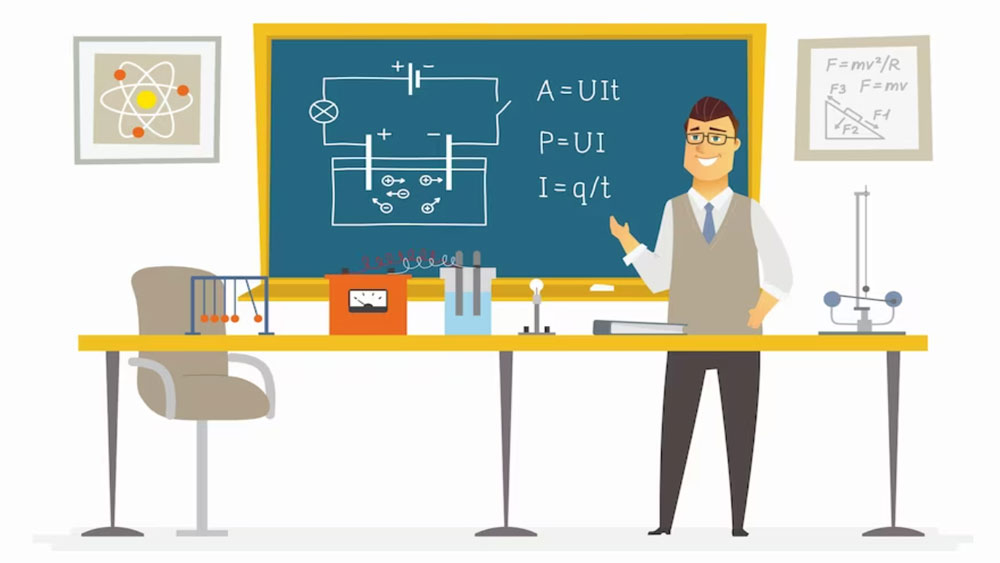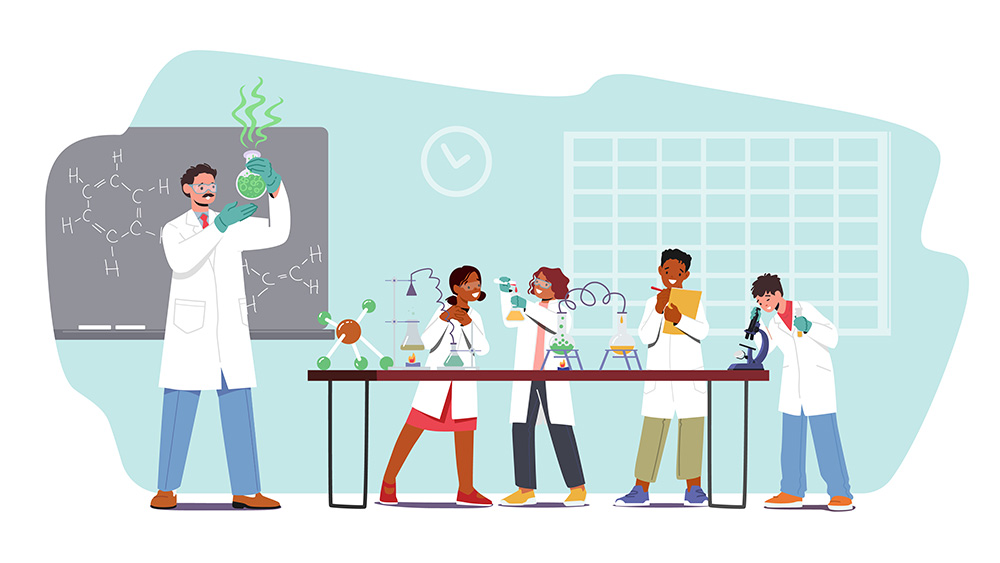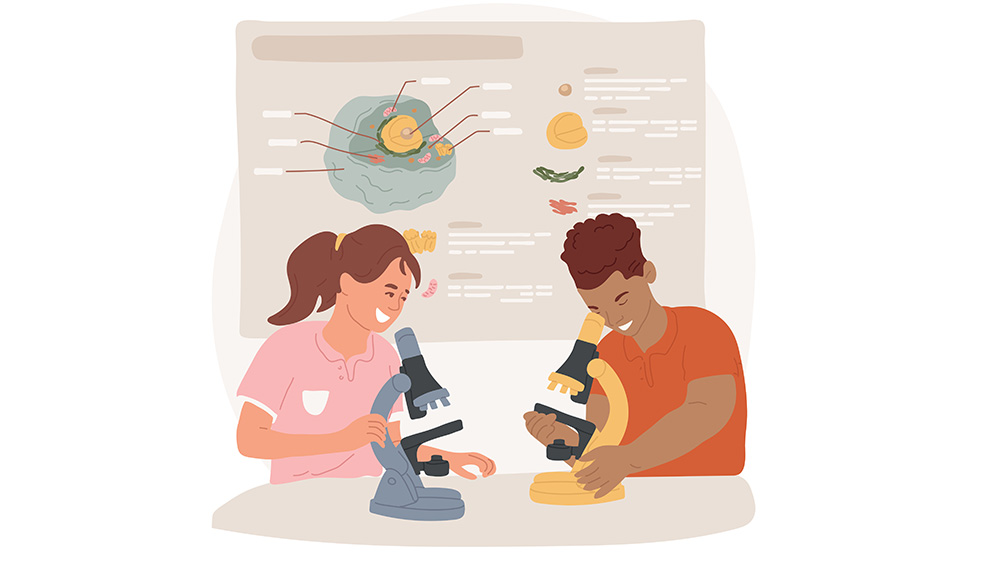Why To Choose IGCSE Chemistry?
The Cambridge IGCSE curriculum fosters the development of a variety of transferable abilities, such as handling data, using the scientific method, and solving real-world problems. Students acquire important attitudes like concern for precision and accuracy, impartiality, integrity, open-mindedness, initiative, and creativity. They gain the fundamental scientific knowledge needed to go to more advanced coursework or career.
Students who take the IGCSE in chemistry learn about the technological environment in which they live and are inspired to develop a critical interest in science and technology advancements. The principles of elements, compound structure, and reactions related to different kinds of chemical compounds are all covered in this course.
IGCSE tutions instructs students on the significance of Chemistry principles that serve to enhance life’s basic necessities, including food, clothes, air, shelter, health, and energy. This course is structured to assist students in comprehending the value of field research and development so that they can manufacture high-quality goods and services to meet human needs.
The teaching strategy for Cambridge IGCSE Chemistry promotes student confidence, engagement in science education, critical thinking, and the use of scientific language to express one’s beliefs.
- Responsible, methodical, and safe behaviour whether working alone or in a group
- Introspective, interested in scientific topics that impact the individual, the community, and the environment, and benefiting from their experiences
- Inventive, assuming new challenges with confidence and creativity
- Engaged, eager to learn scientific techniques, and interested in how scientific principles are used in real-world situations. An IGCSE chemistry tutor in India can help in learning chemistry properly, so call the GIBM for tuition now!
What are the mathematical requirements for the IGCSE chemistry on which the GIBM works?
At this level of study, it is anticipated that a IGCSE mathematics curriculum will include these requirements.
In all areas of the exam, calculators are permitted.
Numbers
- Combine, deduct, multiply, and divide
- Use reciprocals, decimals, fractions, percentages, and ratios.
- Use standard form
- Be aware that a computation just rounds its final result.
- Use proper significant figures and decimal places.
Algebra
- In algebraic expressions, employ positive, whole number indices.
- Substituting quantities’ values into equations while using standardised units
- When all the other provisions are known, resolve any one term in basic algebraic equations.
- Recognize and put inverse and direct proportion to use
Measurements and Geometry
- The definitions of an angle, curve, radius, circle, diameter, circumference, square, rectangle, and diagonal
- For collecting data and the outcomes of calculations, choose and utilise the most relevant units.
- Conversions between units are available for cm3 and dm3, mg, g, and kg, J and kJ, Pa and kPa, among others.
Statistics, graphs, and charts
- Make graphs and charts using the data
- Interpret graphs & charts, taking into account data extrapolation and interpolation
- Sketching a tangent curve is one way to calculate a line’s gradient (slope) on a graph.
- Find the line’s intercept on a graph, then, if applicable, extrapolate the line graphically.
- Choose appropriate axes and scaling for graphs.
- A graph can be used to determine direct proportionality.
- Calculate the average for a collection of information and use it.
General tips for the IGCSE chemistry preparation
‘IGCSE is a challenging subject. When preparing for a test of this importance, one can’t take any chances. The planning must be extremely solid and trustworthy. Students must master the entire curriculum in order to comprehend the technological society in which they live and acquire an informed passion in technology and scientific advancements. Through a combination of practical and theoretical studies, students are able to comprehend the fundamentals of chemistry.
Here are a few suggestions to score good in IGCSE chemistry:
Recognize prior to memorization
Chemistry success depends on having a solid conceptual basis in the topic. Language used in chemistry is uncommon on a daily basis. Students who are unfamiliar with the Chemistry terminology may find it challenging to succeed in the course. Their terminology has distinct connotations. Thus, in order to assure future success, it is critical that students strive for a solid foundation from the start.
Produce flash cards
IGCSE Chemistry requires knowing a tonne of equations, reaction conditions, and oxidation states. To assist you remember all you need to know, you should make flashcards with all of these details. Flash cards are also an excellent way to brush up on your chemistry while you’re waiting at the dentist or on the bus. You will recall information better if you constantly review your flashcards.
Study wisely
A large portion of chemistry involves understanding the extensive language used in the subject. Students must therefore be wise in how they study and solidify their information. Try using proactive Remembering and other scientific investigations techniques to improve the efficacy of your learning rather than repeatedly reading the textbook.
Students must actively recollect the facts from their memories. Students are taught to recover the appropriate information when they see keywords through active recall. Information retrieval will get simpler with lots of experience, and learning chemistry will naturally become less intimidating. Call the IGCSE chemistry tutor in Delhi, India from the GIBM to consult more!
Practice makes the man perfect
Chemistry reactions are best remembered by practise. After you’ve finished rewriting, practise jotting down all the responses to a specific topic. To obtain a sense of the kinds of questions to anticipate, it can be helpful to practise with previous exams. To get the most accurate practise, simulate test conditions by pacing yourself and practising a past paper without looking at your books. Even though it sounds cliche, practise makes perfect!
What is the significance of practical in IGCSE chemistry?
One of the key resources that help our students understand scientific information and scientific methodology is science practical. However, we are aware that completing practical assignments in class comes with certain difficulties. Teachers have discussed with us the challenges they experience in locating appropriate time, place, and resources. Along with student inexperience with identifying and utilising scientific equipment, they are also worried about safety and health risks.
There is, of course, a substitute to the IGCSE Practical Paper preceding IGCSE AS & A Level, which means students may have performed very little practical stuff at Cambridge IGCSE. With a huge syllabus to cover and pupils who are unsure of the tools and procedures, this frequently implies that pupils lack a portion of the fundamental scientific knowledge needed for practical work.
The advantages of practical experience are obvious. It aids students in developing the fundamental abilities that not only enable a smooth transition to higher education but also offer up career opportunities in science.
FAQ'S
How to get good marks with the help of IGCSE chemistry tuition in Gurgaon?
Previous papers are crucial. Every year, there are a lot of questions that are the same, particularly on Paper 2 (MCQs). Additionally, if your institution has chosen to use practice paper 6 (alternative to practical), be sure to complete it. Most people usually ignore that paper, and many points are lost in it.
What are the advantages for IBGA students of consulting an IGCSE Chemistry tutor for help with stoichiometry comprehension during IGCSE tutorials?
To help students grasp stoichiometry principles, such as balanced chemical equations and molar ratios, for effective coursework completion, IBGA offers specialist IGCSE tutoring in Chemistry.
In what ways does an IGCSE Chemistry instructor in Gurgaon use real-world examples to help students understand the role catalysts play in chemical reactions?
To guarantee that students have a complete knowledge, an IBGA IGCSE Chemistry tutor uses real-world examples in IGCSE tutorials to show how catalysts affect rates of reaction without being consumed.
How IBGA’s advice helps with its IGCSE chemistry tuition in Gurgaon?
The following advice will help you get ready for the IGCSE Chemistry test:
- Prior to memorization, comprehend: There is a lot of terminology in chemistry.
- Learn wisely: Apply active learning strategies.
- Regular practice: To familiarize yourself with the structure and style of the tests, use previous papers and practice problems.
- Employ visual aids Make visual assistance.
- Ask for assistance if necessary: Obtain additional aid and tuition.
- Take pauses: Remain well and control your stress.
What are the strategies adopted by an IGCSE Chemistry tutor from IBGA?
- Establishing a study plan
- Utilizing flashcards
- Finding a study partner
- Organizing a study session
- Taking part in talks in class
- completing tasks on schedule
- Regularly going over the materials and textbooks
- concentrating on your areas of need for development
- Increasing your capacity for independent learning
- Establishing lofty goals
Why IGCSE chemistry tuition is so important?
IGCSE Chemistry is regarded as a difficult course. Because it contains so many ideas and theories, it is the second-hardest IGCSE subject. A thorough comprehension of chemical fundamentals is necessary. An impressive 85% of students pass the IGCSE Chemistry exam. Achieving good grades in Chemistry is still feasible, but it takes ongoing work on the part of the students. There are those who claim that achieving a 9 in IGCSE Chemistry is achievable with appropriate preparation and study methods.
How many papers are there in IGCSE Chemistry?
The Cambridge IGCSE Chemistry (0620) curriculum has a maximum total score of 200. There are four exam papers:
- Paper 1: forty multiple-choice questions with a 45-minute time limit and 40 points
- Paper 2: one hour and fifteen minutes in length, accounting for 38.9% of the final score
- Paper 5: Three problems with 40 marks, two of which call for experiments
- Paper 6: 4 questions totalling 40 marks that must be answered in an hour.
How much is the passing score for IGCSE, explained by IGCSE chemistry tutor?
The IGCSE has no predetermined pass score. Every exam sitting results in a new set of grade boundaries. The topic and exam session might have an impact on the IGCSE pass rate. Usually, a grade of 4 or higher is regarded as a “pass”. A “C” on the CAIE IGCSE is frequently regarded as a passing score. Another well-known test board, Pearson Edexcel, has a grading scheme with a range of grades from 1 (lowest) to 9 (highest). A score of four is regarded as a “standard pass,” whereas five or more is regarded as a “strong pass.”
What justifies the need for IGCSE Chemistry tuition?
There are numerous causes why a student could require tuition for the IGCSE. While some students may find it difficult to study a particular subject, others might want additional assistance to get ready for an exam. Students who want to do well on their exams might also benefit from IGCSE tuition.
How can I locate a reputable IGCSE Chemistry tutor?
You have a few options for locating a qualified IGCSE tutor in Delhi. Get suggestions from your family, friends, and teachers first. To find tutors in your region, you may also do an online search. Make sure to interview potential tutors once you’ve narrowed down your options.
Related Courses
WHAT STUDENTS SAY












